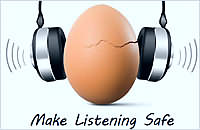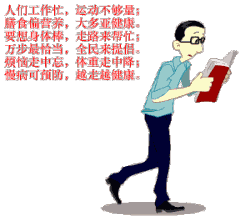
2015.2.27日内瓦| 11亿青少年和年轻成年人在由于使用不安全的个人音频设备(包括智能手机,和暴露在嘈杂的娱乐场所如夜总会、酒吧和体育赛事)造成听力损失。对身心健康及教育和今后的就业带来潜在性影响。
研究数据表明高收入国家,青少年和年轻的成年人年龄12-35岁之间,近50%人使用不安全水平的个人音频设备,在娱乐场所的声音,大约40%人暴露于潜在的破坏性的分贝水平。不安全水平的声响水平,暴露超过85 分贝decibles(DB)八小时或100分贝超过15分钟。
“因为很多年轻人喜欢高分贝的音响,因此越来越多的年轻人存在听力损失的风险,”库克香槟Etienne博士,是负责的部门管理的非传染性疾病,残疾,暴力和伤害的预防工作,他说:“年轻人应该知道,一旦你失去你的听力,它是无法挽回的。应当采取简单的预防措施来享受没有危险的音响。”
安全的听力取决于声音的强度或响度,和持续时间和频率。暴露在响亮的声音可以导致暂时性听力损失或耳鸣是耳鸣。如果声音特别大声,经常或长期的,它可能导致的内耳的听觉细胞永久性的损伤,导致不可逆的听力损失。
WHO的建议
在工作场所的噪声最高允许水平是85分贝,≤八小时/天。许多夜总会,酒吧和体育场馆往往存在更高的声音,因此应该减少暴露时间。例如,暴露在100分贝的噪音水平,不超过15分钟。
年轻人应当更好地保护自己的听力,戴耳塞时保持适宜音量,还应当限制使用个人音频设备和从事噪声活动,让听力得到休息。日常超过一个小时。随着智能手机的应用程序的帮助,可以监控安全听力水平。另外要留意听力损失的警告标志,定期的UPS听力检查。
政府也必须设立、改善和加强对娱乐噪声严格立法作用,通过宣传活动提高听力损失的风险意识。家长,教师和医生可以教育年轻人关于安全的听力,而娱乐场所的管理人员可以遵照安全噪声水平来限制各自的场馆音响,并为顾客提供耳塞和“冷”房。制造商可以设计具有安全功能的产品和个人音频设备包装上标识安全信息。
听力安全倡议
每年的三月三日是马克国际爱耳日,是发动“听力安全”的倡议,提请注意不安全的听力的危险和促进更安全的做法。在与全球合作伙伴合作,他们会提醒年轻人,对噪音引起的听力损失,提请政府和团体及家庭、个人关注这个问题。
在世界范围内,今天有3.6亿人由于各种原因引起的听力损失,如噪音,遗传条件,出生并发症,某些传染病,慢性耳部感染,特别是药物的使用,和老化。据估计,所有听力损失的情况下,一半是可以避免的。为了解决这个问题,将对听力损失的数据和信息来影响、促进预防和管理;协助各国制定和实施听力保健,并纳入初级卫生保健系统计划;为培训卫生工作者提供技术资源。
27 February 2015 | Geneva - Some 1.1 billion teenagers and young adults are at risk of hearing loss due to the unsafe use of personal audio devices, including smartphones, and exposure to damaging levels of sound at noisy entertainment venues such as nightclubs, bars and sporting events, according to WHO. Hearing loss has potentially devastating consequences for physical and mental health, education and employment.
Data from studies in middle- and high-income countries analysed by WHO indicate that among teenagers and young adults aged 12-35 years, nearly 50% are exposed to unsafe levels of sound from the use of personal audio devices and around 40% are exposed to potentially damaging levels of sound at entertainment venues. Unsafe levels of sounds can be, for example, exposure to in excess of 85 decibles (dB) for eight hours or 100dB for 15 minutes.
“As they go about their daily lives doing what they enjoy, more and more young people are placing themselves at risk of hearing loss,” notes Dr Etienne Krug, WHO Director for the Department for Management of Noncommunicable Diseases, Disability, Violence and Injury Prevention. “They should be aware that once you lose your hearing, it won’t come back. Taking simple preventive actions will allow people to continue to enjoy themselves without putting their hearing at risk.”
Safe listening depends on the intensity or loudness of sound, and the duration and frequency of listening. Exposure to loud sounds can result in temporary hearing loss or tinnitus which is a ringing sensation in the ear. When the exposure is particularly loud, regular or prolonged, it can lead to permanent damage of the ear’s sensory cells, resulting in irreversible hearing loss.
WHO recommendations
WHO recommends that the highest permissible level of noise exposure in the workplace is 85 dB up to a maximum of eight hours per day. Many patrons of nightclubs, bars and sporting events are often exposed to even higher levels of sound, and should therefore considerably reduce the duration of exposure. For example, exposure to noise levels of 100 dB, which is typical in such venues, is safe for no more than 15 minutes.
Teenagers and young people can better protect their hearing by keeping the volume down on personal audio devices, wearing earplugs when visiting noisy venues, and using carefully fitted, and, if possible, noise-cancelling earphones/headphones. They can also limit the time spent engaged in noisy activities by taking short listening breaks and restricting the daily use of personal audio devices to less than one hour. With the help of smartphone apps, they can monitor safe listening levels. In addition they should heed the warning signs of hearing loss and get regular hearing check-ups.
Governments also have a role to play by developing and enforcing strict legislation on recreational noise, and by raising awareness of the risks of hearing loss through public information campaigns. Parents, teachers and physicians can educate young people about safe listening, while managers of entertainment venues can respect the safe noise levels set by their respective venues, use sound limiters, and offer earplugs and “chill out” rooms to patrons. Manufacturers can design personal audio devices with safety features and display information about safe listening on products and packaging.
Make Listening Safe initiative
To mark International Ear Care Day, celebrated each year on March 3rd, WHO is launching the “Make Listening Safe” initiative to draw attention to the dangers of unsafe listening and promote safer practices. In collaboration with partners worldwide, WHO will alert young people and their families about the risks of noise-induced hearing loss and advocate towards governments for greater attention to this issue as part of their broader efforts to prevent hearing loss generally.
Worldwide, 360 million people today have moderate to profound hearing loss due to various causes, such as noise, genetic conditions, complications at birth, certain infectious diseases, chronic ear infections, the use of particular drugs, and ageing. It is estimated that half of all cases of hearing loss are avoidable. To address this issue, WHO collates data and information on hearing loss to demonstrate its prevalence, causes and impact as well as opportunities for prevention and management; assists countries to develop and implement programmes for hearing care that are integrated into the primary health-care system; and provides technical resources for training health workers.
Media contacts
Laura Sminkey
Communications Officer
WHO Department for Management of Noncommunicable Diseases
Disability, Violence and Injury Prevention
Telephone: +41 22 791 4547
Mobile: +41 79 249 3520
E-mail: sminkeyl@who.int




